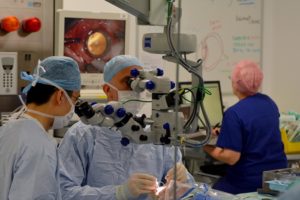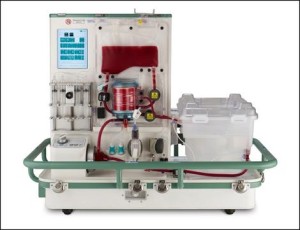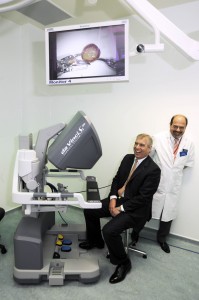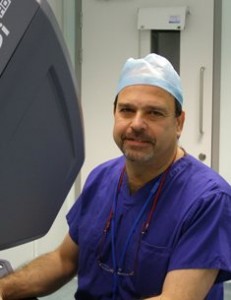Pioneering gene therapy has restored some vision to patients with a rare form of genetic blindness for as long as four years, raising hopes it could be used to cure common causes of vision loss, new University of Oxford research published today shows. A technique which involves injecting a virus ... READ MORE
News for Surgical Innovation, Technology and Evaluation
Blind woman’s joy as she reads the time thanks to “bionic eye”
A patient who is the first in the UK to receive the world’s most advanced “bionic eye” has been able to read the time for the first time in more than five years. The moment Rhian Lewis, 49, realised she had correctly told the time is captured on BBC’s “Trust Me I’m A Doctor”, to be broadcast on ... READ MORE
Bionic eyes give us a look into future of medical technology
BIONIC eyes, lung imaging and pregnancy apps were part of an exhibition revealing life-changing research taking place in Oxford. Members of the public had a rare opportunity to meet surgeons, nurses and clinical researchers who are building the next generation of clinical techniques to ... READ MORE
Surgery offers better survival rates for most men with localised prostate cancer
Surgical treatment offers better survival rates than radiotherapy for most men with clinically localised prostate cancer, according to one of the largest studies of its type. Researchers in Oxford, Stockholm, and the Netherlands compared data from more than 34,000 patients in Sweden over a 15-year ... READ MORE
Device keeps human liver alive outside body
World first: human liver kept alive and functioning on machine outside patient’s body World first: livers kept alive on device successfully transplanted into two patients Oxford University machine could as much as double number of livers for transplant Technology currently being trialled for ... READ MORE
Royal visit to Oxford’s Churchill Hospital
The Duke of York visited the Churchill Hospital in Oxford today to mark the opening of the new building. The building, that includes an integrated Cancer and Haematology Centre, provides a base for many NIHR Oxford Biomedical Research Centre projects. Chairman of Oxford University Hospitals ... READ MORE
Gene therapy trial begins for blindness caused by choroideraemia
Professor Robert MacLaren from the University of Oxford and Professor Miguel Seabra from Imperial College London are undertaking a clinical trial using gene therapy to treat a disease that causes blindness known as choroideraemia. This condition is currently incurable and affects thousands of people ... READ MORE
First electronic retina implanted in the UK
Surgeons in Oxford are the first in the UK to successfully implant an electronic retina into the back of an eye. On 22 March 2012, Chris James became the first patient in the UK to receive this ground-breaking surgery as part of a clinical trial being carried out at John Radcliffe Hospital and ... READ MORE
Man treated in Oxford for blindness with gene therapy
Researchers in Oxford have treated a man with an advanced gene therapy technique to prevent him from losing his sight. It is the first time that anyone has tried to correct a genetic defect in the light-sensing cells that line the back of the eye. The president of the Academy of Medical ... READ MORE
New retinal implant technique is being trialled in Oxford
A new retinal implant technique is being trialled at the Oxford Eye Hospital in 2011 for the first time in the UK. Professor Robert MacLaren, Consultant Retinal Surgeon at the Oxford Eye Hospital, is leading a trial to look at new technology that aims to restore sight to blind patients. By ... READ MORE
Oxfordshire patients to benefit from robotic surgery
The University of Oxford and the Oxford Radcliffe Hospitals NHS Trust have acquired the latest technology in robotic surgery, the only one of its kind in the UK. The new £2 million instrument in the recently opened Oxford Cancer Centre will benefit patients undergoing keyhole surgery to remove ... READ MORE




